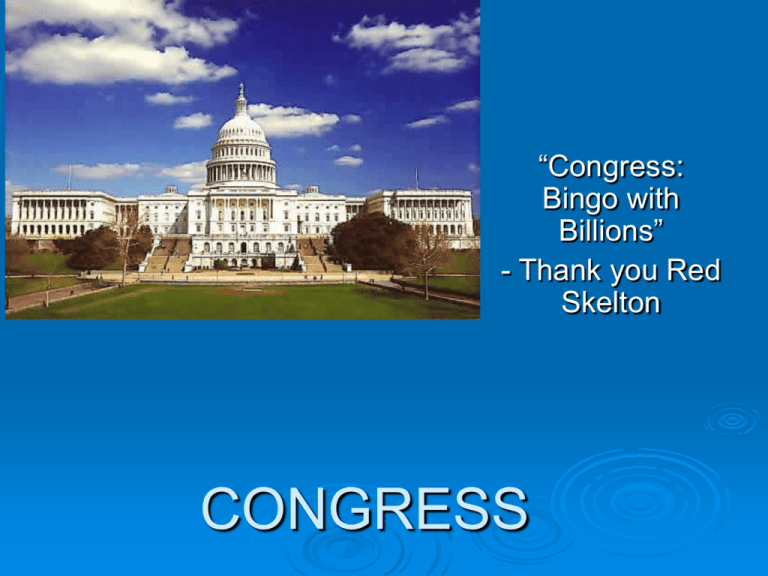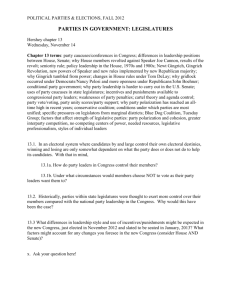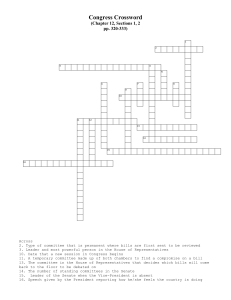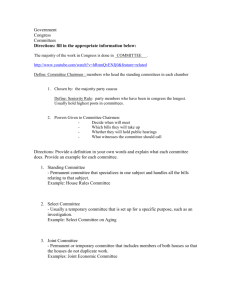
“Congress:
Bingo with
Billions”
- Thank you Red
Skelton
CONGRESS
Who Gets to Congress?
Members of the House and Senate
are predominantly middle-aged,
white, Protestant, male lawyers.
But people with these
characteristics do NOT all have
similar opinions
Of late, the number of blacks and
women in the House has been
slowly increasing.
More important is the proportions
of representatives serving several
terms and occupying safe rather
than marginal districts.
The cast-iron dome of the United
States Capitol, constructed
between 1855 and 1866
.
What has changed?
Contains portrait busts of the early
explorers John Cabot, Christopher
Columbus, Sir Walter Raleigh, and Sieur
de La Salle.
In 1869 the average
representative had served only
one term in Congress
By the 1950s over half the
representatives had served
four or more terms
In the nineteenth century the
federal government was not
very important, Washington
was not a pleasant place in
which to live, and being a
member of Congress did not
pay well
Demographics of Congress
Age
30 – 39
40 – 49
50 – 59
60 – 69
Over 70
3%
19%
39%
29%
10%
In the relief panels above the four entrances are scenes from American
colonial history:
Conflict of Daniel Boone and the Indians
Landing of the Pilgrims
Preservation of Captain Smith by Pocahontas
William Penn's Treaty with the Indians
Ethnicity
African
American
8%
American
Indian
Asian
1%
1%
Asian
1%
Indian
Caucasian 86%
The Crypt – not for the
deceased!
Hispanic
5%
Gender
Male
84%
455 members
Female
16%
84 members
Baptism of
Pocahontas
Marital Status
Divorced
6%
32
Domestic Partner
1%
1
Engaged
1%
1
Married
84%
454
Separated
1%
1
Single
7%
37
Widowed
2%
13
Religious Affiliation
African Methodist Episcopal3
Assembly of God2
Baptist67
Catholic150
Christian21
Christian Non-Denominational1
Christian Reformed1
Christian Science5
Church of Christ3
Evangelical 1
Church of Jesus Christ of Latter-day Saints2
Church of the Nazarene1
Community of Christ1
Congregationalist5
Disciples of Christ2
Episcopal41
Evangelical Presbyterian1
Greek Orthodox3
Jewish37
Lutheran18
Methodist59
Moravian1
Mormon15
Not Affiliated1
Not Stated12
Presbyterian47
Protestant24
Reformed Church of America1
Roman Catholic2
Serbian Orthodox1
Seventh-day Adventist2
Southern Baptist3Unitarian3
United Church of Christ3
Party
Affiliation
Declaration of
Independence –
John Turnbull
Democratic
Independent
Republican
46%
1%
53%
250
2
287
Why so many Incumbents?
Because the job is more
attractive today, we expect
more serious challenges
By 1970, however, over threefourths of running incumbents
won with 60 percent or more of
the vote
The cause may be
re-districting changes and
voters' anti-incumbency
attitudes
Still, the majority of House
incumbents seeking reelection
are successful.
Discovery of the Mississippi
By William Powell
Commissioned in 1847
Redistricting with the Census
Malapportionment: deliberately creating
disparity in number of people in each district
Gerrymandering: drawing boundaries to ensure
party victory
Congress decides size of House
Congress reapportions representatives every
ten years
1964 Supreme Court decision requires districts
to be drawn to ensure "one person, one vote"
Senators
Senators are
somewhat less
secure
In fewer than half of
their races does the
winner get 60 percent
or more of the vote.
President Pro Tempore
Daniel Inouve, Hawaii
Incumbency Theories
Voters are voting their
party identification less
and less and may
therefore be voting for
the candidate whose
name they recognize
Incumbents have more
ways to get their
names known
Also, incumbents can
use their powers to get
(or may simply take
credit for) federal
grants, projects, and
protection for local
interest groups.
Embarkation of the Pilgrims
By William Weir
1837
Characteristics of Representative
Representatives are more
likely to be
white, male
senior in terms of years of
service
Democrats
This is because more
voters consider themselves
Democrats than
Republicans (though this is
changing)
And because the
advantages of incumbency
began to take effect after
the Democrats gained
control of Congress
Landing of Columbus, 1836
Who was President?
In only seven Congresses
since the New Deal have
the Democrats failed to
control both houses
1.
2.
3.
4.
5.
6.
7.
1947-1948
1953-1954
1981-1982
1983-1984
1985-1986
1995-1996
1997-1998
Harry S. Truman
Dwight D. Eisenhower
Ronald Reagan
Ronald Reagan
Ronald Reagan
William Clinton
William Clinton
Why Congressional Incumbents
Incumbents have certain
Win
advantages over their
challengers
First, winning elections
gives an incumbent a set
of developed "strategies
that seemed to work at
least once
They may not know
exactly why; but they do
know their strategies
apparently brought voter
approval
In future electoral
contests, "tradition"
serves as an important
guide for the incumbent.
The challenger does not
have that reservoir of
experience
Surrendering of Burgoyne,
1817
Another Turnbull
Opportunity to Practice between
Campaigns
Second, incumbents constantly contacting their
constituents and powerful groups, whereas the
challenger has only limited contact prior to the campaign.
It is not only the lack of money or name recognition;
inexperience with the difficult learning situation that campaigns
provide.
Without an already successful strategy, and with fewer
opportunities to learn from experience and evaluate the
effectiveness of their strategies, challengers start out
with a learning deficit compared with most incumbents.
Incumbent members of
Congress can be defeated
Incumbency can lead to
stagnation
existing strategies may
become so fixed that the
incumbent fails to adapt in
time to a changing political
environment
they can become “victims of
victory" (Hershey)
The challenger who sees
shifts in the district's mood,
population, and policy
preferences before the
stagnant incumbent does
can win
Is the Challenge
Hopeless?
Why is the Senate more
Vulnerable?
Greater media
exposure given to
Senate races
Challengers also
receive media
attention
Surrender of Cornwallis, 1817
Another Turnbull
gives challengers a
boost in gaining
name recognition
among voters
The press does not
investigate House
challengers as
seriously. WHY?
Congressional Organization
Congress is not a single
organization but a vast
collection of
organizations.
In the Senate,
leadership is in the
hands of a majority
leader, chosen from
among the majority
party
Senate Majority Leader
Harry Reid – Democrat NEVADA
Party Organization
And a minority leader, chosen from
the other party
The whip
Minority Leader
MITCH MCCONELL –
KENTUCKY - REPUBLICAN
takes a nose count of how votes are
lining up on controversial issues
keeps the party leader informed
and rounds up members for
important votes.
The Democratic Steering Committee
and the Republican Committee on
Committees assign senators to
standing committees.
Such assignments are extremely
important to a senator's career
prospects.
In the House
Rep. John Boehner
Elected by the whole of the
House of Representatives, the
Speaker acts as leader of the
House and combines several
roles:
the institutional role of
presiding officer and
administrative head of the
House,
the role of leader of the
majority party in the House,
and the representative role of
an elected member of the
House.
The Speaker of the House is
second in line to succeed the
President, after the Vice
President
Eric Cantor
Party Structure in the Senate
Similar with two important exceptions
The leadership has more power in the House, because
the House is a very large body that must restrict debate
and schedule its business
In the House, the position of Speaker carries
considerable power.
The Speaker may decide whom to recognize in debate
whether a motion is relevant and germane
and to which committees new bills are assigned
The Speaker also influences
which bills are brought up for a vote
appoints members of special and select committees
and nominates majority-party members of the Rules Committee.
The Party Vote
Party is a very important determinant of a
member's vote-more important than any other
single thing
However, party voting in Congress is still not as
important as in a parliamentary system
In Congress party voting has been declining
Party voting is probably actually ideological
voting:
Republicans in both houses are predominantly
conservative and Democrats liberal.
Caucuses
Associations of
congressional
members
Support an
ideology or act on
behalf of
constituency
concerns
As of January
1996, there were
129 caucuses in
the Congress.
General Washington resigning
his commission, 1817
Another Turnbull
Six Types of Caucuses
Two types of caucuses are ideologically or interest
based:
intraparty caucuses have members which share a
common ideology (e.g., the Democratic Study Group);
personal interest caucuses form around a shared interest in a
particular issue (e.g., Congressional Family Caucus)
The four remaining types of caucuses are constituency
based:
national constituency concerns (e.g., Congressional Black
Caucus),
regional constituency concerns (e.g., Western Caucus),
state or district constituency concerns (e.g., Rural Caucus),
industrial constituency concerns (e.g., Steel Caucus).
Senate
Committees
Here is where the
real work of
Congress is done
and where most of
the power is found
Standing
committees are the
most important,
because they are
(with a few
exceptions) the only
ones that can
propose legislation
by reporting a bill
out to the full House
or Senate
Aging
Agriculture
Appropriations
Armed Services
Banking
Budget
Commerce
Energy
Environment
Ethics
Finance
Foreign Relations
Health, Education,
Labor & Pensions
Homeland Security & Govern. Affairs
Indian Affairs
Intelligence
Judiciary
Rules
Small Business
Veterans' Affairs
Other Committees
Select
committees last for only a few
Congresses and have a specific purpose
Joint committees are those on which both
senators and representatives serve
Conference committees try to resolve
differences between House and Senate
versions of the same legislation
Joint Committee on Printing?
The principal purpose of
the Joint Committee on
Printing is to oversee the
functions of the
Government Printing
Office and general
printing procedures of the
Federal Government.
Joint Committee on Taxation
Too long to explain!
Joint Committee on the Library?
No explanation
The Joint Economic Committee
(JEC) was created when
Congress passed the
Employment Act of 1946. Under
this Act, Congress established
two advisory panels: the
President's Council of Economic
Advisers (CEA) and the Joint
Economic Committee. Their
primary tasks are to review
economic conditions and to
recommend improvements in
economic policy.
Importance of the Chair
Chosen
by seniority
Different committees attract different kinds
of Congress members
House Ways and Means Committee and the
Senate Foreign Relations Committee, attract
policy-oriented members;
House Post Office and Civil Service
Committees, provide means of servicing a
constituency and improving chances of
reelection
Staff
Congress has created the most rapidly growing
bureaucracy in Washington
In 1935 the typical representative had two aides;
By 1979 the average had increased to sixteen but has
held fairly steady since then, with the average standing
at fifteen in 1996.
Some staff members (increasingly located in district
offices) service requests from constituents
Other staff members do legislative work, helping the
Congress members informed
How a Bill Becomes a Law
In the House, a bill is introduced by dropping it into the hopper
or handing it to a clerk
In the Senate, by announcing the bill's introduction on the floor
Legislation may be initiated by the president and enacted by
Congress, but Congress often initiates legislation;
The consumer and environmental legislation of the 1960s and
1970s are good examples.
Study by Committee
The bill is referred to a
committee
There are rules that
govern which bills go to
which committees, but
sometimes a choice is
possible and the bill can
be sent to a receptive (or
unreceptive) committee
Most bills die in committee
Important bills are
generally referred to a
subcommittee for
hearings.
Then the subcommittee
will mark up the bill-make
revisions and additions.
Out of Committee
If a majority of the committee votes to report out the bill, it goes to
the full House or Senate
Otherwise the bill dies, unless a discharge petition (a maneuver
that is rarely successful) brings it to the full House
In the Senate any bill can be proposed on the floor as an
amendment to another measure, so discharge petitions are not
needed.
Bill Goes on the Calendar
In the Senate the majority
leader, consulting with the
minority leader,
schedules bills for
consideration
In the House, the Rules
Committee reviews major
bills and may block action
or send them to the floor
under a closed rule
this limits debate and
forbids amendments,
or under a less favorable
open rule, which permits
amendments from the floor.
Floor Debate
In the House, major bills are
discussed by the Committee of
the Whole under rather tight
restrictions
The committee sponsoring the
bill guides the debate
amendments (if they are
allowed at all) must be
germane
the time allowed for debate is
limited
The sponsoring committee
usually gets its version passed
by the House.
Trent Lott
Voice – aye or no
Division – if voice
vote unsure counts members
standing – no
record of
individual votes
Recorded - Rollcall votes –
individual votes
recorded
Voting
Procedures
Voting in the Senate
There
is no limit on debate (except for
cloture)
the Senate may limit consideration of a
pending matter to 30 additional hours, but
only by vote of three-fifths of the full Senate,
normally 60 votes.
Nongermane
amendments may be
offered, producing a Christmas tree bill
(with goodies for lots of groups)
Just Deal with It !
This
forces the Senate to deal with an
important policy issue in connection with a
trivial bill
In general, the guidelines for Senate
debate are negotiated by the majority
leader and listed in a unanimous consent
agreement.
Conference Committee
Used if a bill passes the House and
Senate in different forms
Differences must be adjusted
before the bill can become law
If the differences are minor, one
house may simply accede to the
changes made by the other
If differences are major, a
conference committee must iron
them out
In most cases, conference votes
tend to favor, slightly, the Senate
version of the bill.
The Mace – symbol of
the Sergeant at Arms.
May be presented before
an unruly member of the
House
The President’s Signature
Official portrait of
George Washington
If both houses accept
the conference report,
the bill goes to the
president for
signature or veto
If the president vetoes
the bill, the veto can
be overridden by a
two-thirds vote of
those present in each
of the two houses.
Does Congress Represent Constituents'
Opinions?
There are three
theories why
members of
Congress vote the
way they do
Dirkson Senate Office Building
Members want to
get reelected and
therefore vote to
please their
constituents
When the issue
is highly visible
and the
constituency is
fairly united in its
stance, as was
the case on civilrights bills in the
1950s and
1960s.
Representational
Organizational
Members of
Congress
respond to cues
provided by their
fellow members.
Such as:
Party
ideological and intra-party
caucuses, such as the
Democratic Study Group,
may also be important.
Members also tend to go
along with their party's
representatives on the
sponsoring committee and
with their state delegations.
Attitudinal
More ideological in
their thinking than the
public at large
Democratic members
tend to be strongly
liberal
Republicans
The WELL, immediately in front of the
conservative
Speaker
This is where members stand to
address the House
Term limits
Current Issues
Lifetime limits produce
amateur legislators who
are less prone to
compromise
Limiting continuous
sequence leads to
office-hopping and push
for public attention
1995, Congress failed to
approve resolutions for a
constitutional amendment
on term limits
Supreme Court ruled
states cannot
constitutionally impose
term limits on Congress
Ethics and Congress
The system of checks and
balances is designed to
fragment political power and
thus prevent any single
branch from becoming
tyrannical.
BUT, this also provides
multiple points of access to
influence government
officials and corruption.
Today this has caused the
public's low opinion of
Congress, with only 17
percent approving of its
performance in 1992.
The series of scandals can
be lumped into three
categories
Violation of Criminal Law
Violation of criminal
law is obviously
unethical
Since 1941, nearly
fifty members faced
criminal charges,
most convicted
1978-1992, charges
of congressional
misconduct against
sixty-three members
31 sanctioned,
convicted
16 resigned or
announced retirement
Financial Improprieties
Use of their political office to
obtain some monetary benefit
they would ordinarily not
receive.
Representative Tony Coehlo,
for example, took a loan from a
political fund-raiser and
resigned over the apparent
conflict of interest;
Senator David Durenburger
was "denounced" by the
Senate for requiring groups to
purchase numerous copies of
his book as payment for
speaking.
In 1989, the powerful Speaker
of the House, Jim Wright of
Texas, was compelled to
resign;
In 1997, Newt Gingrich became
the first Speaker in House history
to be reprimanded.
Sexual Escapades of Congress
The problems have ranged
from Representative
Barney Frank's homosexual
relationship with a male
prostitute to Representative
Donald Luken's 1989
conviction for a sexual
encounter with a sixteenyear-old female.
Recently focus is on sexual
harassment on Capitol Hill;
A 1993 poll by the Washington Post
discovered that one of every nine
female staffers reports having been a
victim of sexual harassment by a
member of Congress.
Packwood – Rep.
Senator Robert
Packwood was forced to
resign in 1995, after the
Ethics Committee
recommended that he be
expelled for having
sexually harassed several
women and for refusing to
be completely cooperative
with the ethics
investigation.
Frank – Dem.
Political Abuse of Power
The Keating Five
Charles Keating, head of Lincoln
Savings and Loan (S&L), contributed an
estimated $1.3 million to the campaigns
of five senators.
These senators in turn intervened on
Keating's behalf during a government
investigation into the mismanagement of
his S&L, an intervention that delayed
government action and eventually cost
taxpayers $2 billion to bail out the
institution when it failed.
The senators responded that they were
acting only to represent a constituent
Only one senator, Alan Cranston (who
was about to retire), received a formal
censure for his activities in this episode.
From Cincinnati, Ohio
Codes of Ethics
Assume corruption is
mainly a monetary
concern.
Favor wealthy
members of Congress
who have no need to
supplement their
incomes.
The Vote to Reprimand Speaker Newt
Gingrich
- 104th Congress
House Democrats claimed that
the new Speaker, Newt
Gingrich (R, Georgia), had
previously engaged in
questionable activities
On December 6, 1995, House
Ethics Committee found
Gingrich guilty of violating
House rules in
publicizing his college course
allowing one of his political
consultants to interview
candidates for congressional
staff positions.
Why was this influence pedaling?
The committee dismissed
two other charges:
It concluded that free cable
broadcasting of the college
course did not have to be
reported as a financial
donation from the cable
company
it only criticized the
acceptance of a book
advance from
HarperCollins, saying that
the action had created the
impression of ,exploiting
one's office for personal
gain."
The deal had originally
involved a $4.5 million
advance, which Gingrich
returned
Let’s Make a Deal
Instead, he agreed to
write one book and
edit another, for a $1
advance and a share
of sales royalties.
HarperCollins was
owned by Rupert
Murdoch, whose
media interests stood
to be affected by
pending legislation
First Speaker to be Reprimanded
Many House Republicans,
whose leaders had
insisted that the report
would be comparatively
mild, felt betrayed.
On January 21, the House
voted in favor of the
disciplinary actions
recommended by the
Ethics Committee.
Newt Gingrich became
the first Speaker to be
reprimanded by the
House of
Representatives.
A short time later,
the Clinton Lewinsky
scandal
Gingrich was calling
for the impeachment
of the President
He assailed the
character of the
President
Then Larry Flynt's
"Hustler Magazine"
offered money for
those with
information about
the extramarital
affairs of the
Republican
members of
Congress
Calling the Duck
a duck
Is Anybody ethical?
Evidence was obtained that
Gingrich had also had an
extramarital affair and he
stepped down from the
speakership and
announced he would not
run for reelection
After the Republican
caucus chose Bob
Livingston as speaker it
was found out that he too
had an affair
Finally the Republicans
settled on Dennis Hastert
as Speaker of the House.
New ethics rules (104th Congress)
Honoraria: House
bans, Senators may
designate charity
Campaign funds:
ban retaining of
surplus
Lobbying: former
members banned for
one year
Gifts: $250 House
limit, $100 Senate
Lobbyist payments
banned for travel,
legal defense funds,
charitable donations
Three Stages of House of Rep.
Mid-1940s to early 1960s
Powerful committee chairs, mostly from the South
Long apprenticeships for new members
Small congressional staffs so members dealt face-to-face
2. Early 1970s to early 1980s
Spurred by civil rights efforts of younger, mostly northern
members
Growth in size of staffs
Electronic voting meant members more often on record
Focus on reelection--sophomore surge
More amendments and filibusters
Early 1980s to Present
Strengthening and centralizing party leadership
Reassertion of congressional power in 1970s
Reaction to Vietnam, Watergate, and divided
government
War Powers Act of 1973
Congressional Budget and Impoundment Act of 1974
Legislative veto included in more laws
Congressional power never as weak as critics
have alleged








